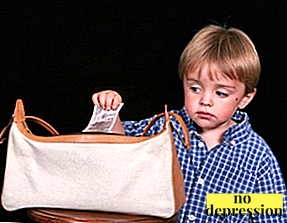Child theft It is widespread, and even wealthy parents who pay enough attention to their children can find out that their child has stolen something.
Children steal for many different reasons, the main of which is revenge, the desire to get what they want at any cost, lack of education, the desire to look more interesting in the eyes of others due to the presence of expensive toys.
General information about child theft

In society, there is a widespread desire to call petty theft, including childish, kleptomania, which is by mistake.
Kleptomania - A mental illness that occurs relatively infrequently.
It is extremely difficult for a kleptoman to hold back the urge to steal something, and thanks to the theft he feels pleasure and relieves nervous tension.
Gusts to steal something from kleptomana intensify if something happens in his life traumatic.
Moreover, such a person may be well aware that he is doing wrong. Most kleptomania trying to fight the disease with the help of psychiatrists and psychotherapists.
Most often kleptomania occurs in 30-40 years. In childhood this disease is a great rarity. Therefore, child theft is called stealing, not kleptomania.
Even a child who does not lack toys and tasty food can steal, but children from dysfunctional families more often stealwho regularly experience a sense of inferiority, looking at their happy peers, dressed in beautiful clothes and bringing interesting toys to the team.
The active desire to steal from such children can be combined with other deviant features, for example, with increased aggressiveness.
Why do children steal?

Why do children steal? The main causes of child theft:
- Impulsive desire to get what you want by all means. This is especially true of children under the age of seven or eight, who are not always able to fully control their own impulsive desires. The child saw an attractive object and took it, almost without thinking about the consequences. Even if he has certain moral attitudes, the desire to possess an object is stronger than the fear of punishment.
- The desire to attract the attention of others with a beautiful toy. Children rather quickly notice that a child with an interesting and colorful toy or a tasty meal instantly attracts the attention of his peers: everyone wants to make friends with him, to talk, because there is an opportunity to get sweet or play with a wonderful toy. Many children begin to see a causal relationship in this: if I have an interesting subject, they will love me, I will get friends.
It is important for parents and educators to give children a different attitude: true strong friendship is built differently, and personal qualities in it are much more important than toys.
- Theft for fun, adrenaline rush. This is more true for teenagers. In adolescence, a person is actively looking for himself and can make the wrong moral conclusions. If a teenager contacts the wrong company, he can try to steal something. Most often - because of the desire to earn, and sometimes - just to feel the excitement, to prove their own coolness to themselves and their friends.
- Revenge. A child may try to take revenge on an adult or another child who has offended him by stealing an expensive item. And the object itself is often not interested. Children, stealing from revenge, may try to damage the stolen item in order to get revenge stronger (tearing up bills, smearing a toy).
- Gaps in the upbringing of the child. Every parent should make sure that his child receives the necessary moral attitudes. Children should explain the difference between "their" and "alien" in the first years of life and further improve these settings. Moreover, gaps in education can occur in children from families of different levels. At risk children from extremely dysfunctional families in which parents do not pay any attention to education.

In extremely rare cases, a child steals because an important adult asked him to do so, for example, one of his parents, or when an adult clearly told him that it is good to steal. This applies to a small percentage of marginal families.
The factors that increase the likelihood that a child will want to steal are financial problems in the family. However, even a child from a family in dire need is unlikely to commit a theft if his parents gave him a clear moral attitude about it.

Therefore, this factor can significantly increase the likelihood only if there are additional factors, such as the lack of proper upbringing, life with toxic or marginalized parents, negative influence of friends, acquaintances.
Also, children who lack attention and love are more likely to steal and deceive.
Psychologist tips
If a child has stolen something and you should respond immediately (that is, you just found out), it is important:
- Do not go to aggression. Firstly, you could be misinformed: perhaps there was some kind of mistake and the child didn’t actually steal anything. Secondly, any aggression is not constructive and will only increase the psycho-emotional trauma that a child will have when he is fully aware of what has happened. Try to calm down. Drink water, count to ten, take a couple of deep breaths and then move on to serious actions.
And it is necessary to deal with the situation, discuss it with the child only when you are clearly confident that it was he who stole it.
- Realize that right now bring to the child the necessary postulates will not succeed. You all need to calm down.
 Do what you can do at the moment: talk to the victims (the seller, the parent of the child who had something stolen, the administration), think about how you can fix what happened. At the same time, try to explain to the child that he did a bad thing and it is impossible to steal. Speak in a confident, firm voice, devoid of aggression. Do not raise a hand on the child.
Do what you can do at the moment: talk to the victims (the seller, the parent of the child who had something stolen, the administration), think about how you can fix what happened. At the same time, try to explain to the child that he did a bad thing and it is impossible to steal. Speak in a confident, firm voice, devoid of aggression. Do not raise a hand on the child.
When you and the child find yourself in a relaxed atmosphere, then you need to go to full discussion of the situation. Ask questions related to what happened.
Most likely, the child will not be able to tell everything in detail, will cry and may be completely silent, without saying anything on the case.
This is normal: he experiences what has happened, feels helpless and upset. It is important at this moment not to break on him.
The child stole something in the store - recommendations:
- If the item from the store is in proper condition, it should immediately return and explain to the seller together with the child. It is important that the child apologizes.
- If the seller does not want to take the goods back or the goods are in poor condition, it is important to talk with the child this moment: to explain to him that now he will have to pay for what he stole. If the child has pocket money, they must be used to pay, so that he is aware of the loss.
Child stole from parents - advice:
- Try to calm down, keep a low profile. Ask him in a relaxed atmosphere about why he did it and what he planned to buy with the money taken without asking. During the discussion, avoid harsh words (“thief”, “criminal”, “stole”), which will only increase the tension and will not help solve the situation.
- If the child does not have pocket money, it is important to discuss with them the possibility of their appearance. Even if the financial condition of the family is deplorable enough, it is important to allocate at least a small amount of money: this will help the child learn to appreciate them and determine priorities. Some children take their parents' money because they do not feel their value and believe that they will not notice the loss.
- If the child already has pocket money, but he is not enough, discuss whether it is possible to increase the amount and due to what. It is useful to put a condition to the child: he takes on some responsibility and because of this he gets more money. Older children can be offered to earn extra money during the summer holidays.

If the child took the money for someone, it is important to understand this situation and if necessary, contact the police (in the case of extortion).
How to deal with the problem?
Recommendations:
- The main thing is prevention. Talk to the child about the theft, offer role-playing games related to this, ask how he would act in certain situations. Clearly explain to him the difference between "alien" and "his" at an early age.
- Take care that your child has pocket money. This will help him better understand their value.
- Foster self-reliance in it. Send more often for shopping, mark the range of things that he needs to do regularly. Children who are aware of their responsibilities from an early age are also more aware of the value of money than children who are overly protective.
- Make sure that the family has a calm, trusting atmosphere. If the child knows that he can trust anything and not get aggression, it will be easier for him to tell about his desires, and the need to steal will disappear.

How to punish a child for theft?
Tips:
- Eliminate any violence. In no case do not raise the hand of a child, do not blame him, do not mock him, do not restrict his movement, do not take away toys.
This will not help anything, but will only aggravate his health and destroy confidence.
- A good option would be to use pocket money. At the same time, the child must clearly understand why the amount of his pocket money will be reduced (explain to him that you will pay this amount for the item he took).
- Up to nine or ten years you cannot punish seriously a child: their volitional sphere is underdeveloped, so it is difficult for them to control themselves. Moreover, “serious punishment” even in the case of older children should not include violence and insults.
- Theft is a problem that requires an integrated approach. Parents should carefully understand the situation and try to solve it constructively, so that there will be no repetition in the future. Such an approach works much better than ordinary punishment.

If a child steals regularly, and exhortations and mild punishment do not work, you must consult a child psychology specialist.
How to wean from addiction?
Key recommendations:
- It is important to solve the problem in a complex, if necessary - to connect a psychologist. It is necessary to find out the causes of theft and work with them.
- For every reason you need to find a constructive solution. If the child does not have enough pocket money, discuss with him the options. If there is a frank lack of financial resources in the family, calmly, without hysteria and aggression, explain the situation to him.
At the same time, if the child has been removed from responsibility and relationships with money all this time, he may not understand the parent's explanations, because the money has not received special value for him.
- If the child is too much care, this must be retreated. Gradually expand his area of responsibility, give more orders. If the child is old enough and has long wanted a pet, get him, but indicate that the main care for him lies with the child.
- Do not leave money openly if the child has already been noticed stealing. Do not increase the temptation to take.
How to explain to the baby that you can not steal?

Tips:
- Give examples, show and discuss content that touches on the subject of theft. For example, you can use pictures that depict various events involving theft. Let the child describe what he sees in the picture and give an opinion. If the subject of theft was shown in a fairy tale or cartoon, you should get an opinion from him (which of the characters did well and who did poorly).
- From an early age it is important to try to explain to him what it means to “own” and what is “alien”. Repeatedly remind him of the difference between his and someone else’s, especially in suitable situations (for example, if a small child picked up someone else’s toy on the playground).
If the child has already been caught stealing, a child psychologist can help change the settings. It is important to refer to him, especially if the child stole repeatedly.
Why do children steal? Opinion psychologist:

 Do what you can do at the moment: talk to the victims (the seller, the parent of the child who had something stolen, the administration), think about how you can fix what happened. At the same time, try to explain to the child that he did a bad thing and it is impossible to steal. Speak in a confident, firm voice, devoid of aggression. Do not raise a hand on the child.
Do what you can do at the moment: talk to the victims (the seller, the parent of the child who had something stolen, the administration), think about how you can fix what happened. At the same time, try to explain to the child that he did a bad thing and it is impossible to steal. Speak in a confident, firm voice, devoid of aggression. Do not raise a hand on the child.

